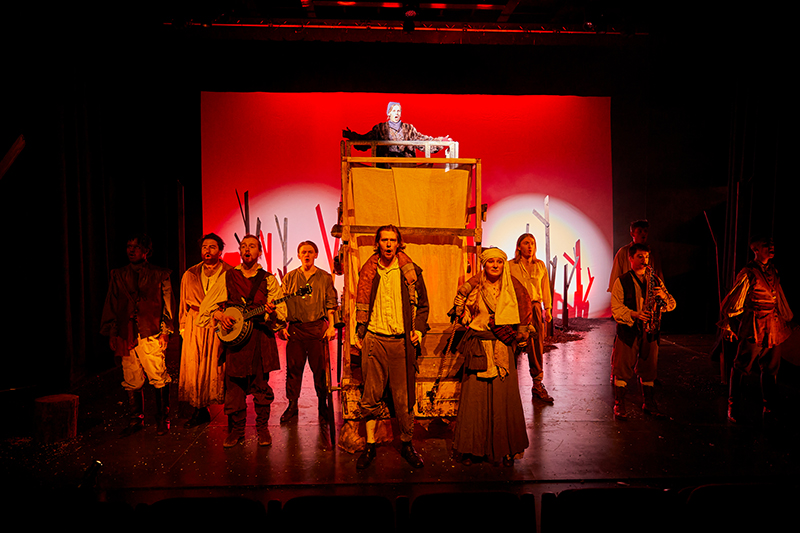The show must go on
In March 2020 theatres around the country faced a final curtain call. The stalls fell silent and the lights were turned off as the COVID-19 pandemic struck.
The performing arts sector was decimated. Most of those who drive its creative work, delivering value to the UK economy working in theatres are freelancers. When those theatres shut their doors, most found themselves suddenly out of work.
Over the past two years, the theatre industry has adapted to survive and as the sector begins to reopen, the road to recovery will not be an easy one.
Research from Manchester School of Theatre at Manchester Met is helping to reveal the true impact the pandemic has had on the theatre industry, as well as looking to the future and what it will mean for the next generation of acting talent.
Immediate impact
Freelancers in the Dark, a collaboration between Manchester Met, East 15 Acting School at the University of Essex, and Queen’s University Belfast, is investigating the impact of the pandemic on theatre freelancers from across the UK.
The study explored the immediate impact as well as the long-term future of the industry and what this might look like as we come out of the pandemic.
Dr Joshua Edelman, Reader in Drama and Contemporary Performance at Manchester Met, a co-investigator on the project, said: “There was this issue of the immediate hit, that a lot of people lost their jobs, their means of supporting themselves, and a lot of people’s lives were upended.
“The project aims to not just measure that immediate hit, but to make sense of how that hit will echo in the long term.”

With freelancers making up a large proportion of the workforce, what happens to them will ultimately impact on the future of the theatre industry.
“When the vast majority of your artists and other workers are freelancers, their experience is going to shape the future of the industry,” said Dr Edelman. “We wanted to know what that experience is, and to talk about what policy interventions and changes can be made so that the industry is nourished and protected.”
The study revealed that a lot of the issues were not just focussed on economics, but also the expectations of people working in the industry.
“People come into a job like theatre-making with some assumptions of what’s going to happen, of what it’s going to look like, the expectations of what your career is going to be like, the kinds of work you to be able to make and what skills you need. And people make very consequential decisions based on that,” Dr Edelman said. “If those change, that can be the biggest single factor in terms of the future of the theatre.”
Early on, one of the main concerns was about freelancers leaving the industry, especially those of ethnic minority, immigrant, and working-class backgrounds.
“If you think about who is going to drop out, it’s the people who don’t have that safety net,” explained Dr Edelman. “And those are exactly the sort of people that the theatre industry over the last 10 years has worked really hard to recruit and support.”
Findings revealed that many theatre freelancers felt ‘worried’ or ‘fearful’ about their future.
These concerns were also intensified by a lack of support from organisations, public bodies, and the government.
“By far the most answered question in our survey so far is around how freelancers feel about the Government’s rhetoric towards the Arts since March 2020,” said Dr Laura Harris, a Postdoctoral Researcher who worked on the project. “The word that keeps cropping up is ‘unvalued’ and we are seeing a lot of anger.”
One of the assumptions made was that freelancers would be supported by theatre organisations, especially those who they worked with frequently. Unfortunately, this was not the case.
Dr Edelman believes this wasn’t because theatre companies couldn’t see the problem, but more that they were concerned about having to close their venues. He explained: “They said, ‘We don’t want to close. What do we need to do too not close?’ And structurally speaking, helping freelancers who had been working, was not as high on their list as maybe they wanted it to be.”
This lack of support drove freelancers to feel ‘disposable’, ‘disappointed’ and excluded from conversations around the future of theatres, something which could impact on future relationships between theatre makers and theatre organisations.
Making adaptations
Over the course of the pandemic, theatre freelancers have adapted to the changes within the industry, with many reorganising their working lives, developing new skills, and finding new ways of working.
Some have developed skills in digital work, using platforms like Zoom to make theatre, or have used their skills in a wider variety of fields across the creative industries, such as gaming, advertising or media.
“We’re seeing freelancers working outside of the theatre industry, finding opportunities that don’t necessarily replace the theatre,” explained Dr Edelman. “But being a little more creative and broader – especially in terms of online media – and frankly, finding that their skills are very valued there.”
Dr Edelman believes that we will start to see new digital skills being incorporated into theatre in the future. “I think we are going to start to see more theatre that incorporates the digital world in some way. We already were before the pandemic, but it’s something that’s going to accelerate.”
Many participants reflected on the fact that the pandemic provided a break and allowed them to reconceptualise the way they supported, worked, and collaborated with other theatre freelancers on both a local and national level.
This allowed freelancers to reconnect with their local regions during the national lockdowns in 2020 and 2021, shifting the way their work engages with local communities across the diverse regions of the UK.
As we moved through the pandemic, feelings of desperation shifted towards feelings of optimism, something which was boosted through peer support and informal networks established between freelancers.
“A lot of grassroots networks have been built, freelancers to freelancers, mutual support networks if you want,” Dr Edelman said.
These findings suggest the power of freelancer networks will play a significant role in post-pandemic policies and systems, shaping the future for the industry.
The next generation
So what does this mean for the next generation of acting talent?
Manchester School of Theatre continues to build its long-standing reputation for training professional actors, theatre-makers and performers, equipping them with the skills needed to forge successful careers in theatre, film, TV and radio.
Many stars have passed through its famous doors, including Steve Coogan, Dame Julie Walters and Game of Thrones’ star John Bradley West.
The next generation of acting talent will have to navigate a new normal for the industry, but from the advantageous position of helping to shape what that future will look like.
Met Magazine spoke to Manchester School of Theatre alumnus Dylan Brady, who graduated from BA (Hons) Acting in 2019, about his experience of working in the industry during the pandemic and his hopes for the future.
Since graduating, Brady has starred in Netflix drama The A List, BBC/Netflix Drama Get Even, and Coronation Street. He is currently developing a coming-of-age drama based on the issues experienced by the queer community.

Brady explained that working in the performing arts industry during the past two years has been a challenge, with many competing for jobs in what was already a crowded market.
“I was very fortunate to be working in the first place. For the most part, the industry shut down and it was a terrifying time for everybody,” Brady explained. “People were desperate to get jobs, as freelancers always are, but there just weren’t any.”
“You had people who were already working in television like me and then you also had all these other actors who would usually find themselves in the theatre, who were all of a sudden trying desperately to work in television at a time where television wasn’t even really being made.”
Performing during the pandemic also brought about a new set of challenges with social distancing restrictions.
As part of his role in Coronation Street, Brady filmed the soap’s first post-pandemic kiss. He became part of a tested cohort with Nathan Graham who played his on-screen boyfriend so they could safely work closer than two meters.
“They had to minimise the amount of time we were breaking social distancing for. With kissing, I think there is something brilliant about letting it be real in the moment,” Brady said.
People were desperate to get jobs, as freelancers always are, but there just weren’t any
These new challenges can feel unnatural. “It’s an industry based on connection, it’s based on human interaction and touch and feel. It’s a very tactile industry,” Brady explained. “But you know, you adapt. Me and Nathan were able to do that and decided who was turning their head in what direction and how long we were going to do it.”
And as we emerge from the pandemic, the industry faces a new set of challenges as it journeys towards recovery.
But change can sometimes be a good thing. Brady is optimistic for the future as the pandemic has given the industry the opportunity to make positive changes.
“I’m hopeful because I think that what the pandemic did was prove that certain things were unsustainable. I think the way that the theatre industry can work and operate can often be very inaccessible and very exclusive,” said Brady.
“There has to be a silver lining in all the darkness, you know, and if that means shaking up the theatre scene and making it fresh and making it new, investing in local talent, then that’s a good thing.”
Manchester School of Theatre’s new performance venue
Manchester School of Theatre’s outstanding new home recently opened its doors to the public for the first time with a series of productions staged in the 180-seater auditorium situated in Manchester Met’s new Grosvenor East building.
To celebrate the opening, final-year acting students showcased their talent with a production of Mother Courage, a contemporary version of Bertolt Brecht’s classic play by David Hare, a powerful and compelling reminder of the disasters of war.

This was followed with a production of Lucy Kirkwood’s The Welkin which tells the story of Sally Poppy in rural 18th century Suffolk, whose life is in the hands of 12 women to decide whether she should be sentenced for a heinous murder.
A fully equipped flexible theatre space seating 180 audience members, the new Theatre auditorium is capable of multiple configurations. Grosvenor East also offers light-filled double-height studio spaces for teaching and rehearsals. One of the studios is fully equipped for productions with smaller audiences, complete with control room and lighting rig.
